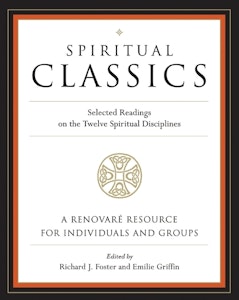Introductory Note:
When I was much younger my father told me that he preferred the Phillips translation. I did not think much about it at the time but every time I read the Phillips selection from Spiritual Classics I think about what my father said. Last week I asked my 92-year-old father why he preferred the Phillips translation. He laughed and said that was a long time ago and I have many other versions of the Bible on my shelf now. He thought for a minute and then he told me about his father sitting in the rocking chair in his bedroom reading the King James Version. Dad said, “I don’t know if he really understood what he was reading but it was his practice to read the Bible every day.” When the Phillips translation became available in the United States, my father was teaching young people in Sunday School. The Phillips translation made the Scripture much easier to understand. He went on to say that the various versions and translations were all helpful. “They are all like facets of a diamond that reflects the brilliant light. What is important is seeing the Light.” It seems to me that the Phillip’s translation of the The New Testament in Modern English helped my father see the Bible afresh.
In the translator’s foreword, J.B. Phillip’s said something about the technique he found helpful. “I have found imaginative sympathy, not so much with words as with people, to be essential. If it is not presumptuous to say so, I attempted, as far as I could, to think myself in the heart and mind of Paul, for example, or of Mark or of John the Divine. Then I tried further to imagine myself as each of the New Testament authors writing this particular message for the people of today. No one could succeed in doing this superlatively well, if only because of the scantiness of our knowledge of the first century A.D. But this has been my ideal, and that is why consistency and meticulous accuracy have sometimes both been sacrificed in the attempt to transmit freshness and life across the centuries.”
Here is one of my father’s favorite passages from the “The New Testament in Modern English.” Phillip’s gives this passage the subheading: I pray that you may know God’s power in practice.
“When I think of the greatness of this great plan I fall on my knees before the Father (from whom all fatherhood, earthly or heavenly, derives its name), and I pray that out of the glorious richness of his resources he will enable you to know the strength of the Spirit’s inner reinforcement that Christ may actually live in your hearts by your faith. And I pray that you, firmly fixed in love yourselves, may be able to grasp (with all Christians) how wide and deep and long and high is the love of Christ and to know for yourselves that love so far beyond our comprehension. May you be filled through all your being with God himself!” —Ephesians 3:14
Margaret Campbell
 Excerpt from Spiritual Classics
Excerpt from Spiritual Classics
Just over two hundred years ago, in 1754 to be precise, Horace Walpole coined the word “serendipity,” which has now come to be accepted into our language. The word, which is derived from the ancient name for Ceylon, is defined as “the faculty of making happy and unexpected discoveries by accident.” Before I go on to discuss the work of translating the Gospels I feel I must mention some of the “happy and unexpected discoveries” which I made in the translation of the Epistles.
Serendipity 1
The first one I will mention, which of course may all the time have been no secret to anybody else, was the expression “rich in mercy” (Eph. 2:4). This struck me as a positive jewel. Just as we might say that a Texas tycoon is “rich in oil,” so Paul writes it as a matter of fact that God is “rich in mercy.” The pagan world was full of fear, and the Christian gospel set out to replace that fear of the gods or the fates, or even life itself, with love for and trust in God. “Rich in mercy” was good news to the ancient world and it is good news today.…
Serendipity 3
I had for some time been worried about the expression “fear and trembling.” It did not seem likely to me that Paul in writing to the Philippians could have meant literally that they were to work out their salvation in a condition of anxiety and nervousness. We all know that fear destroys love and spoils relationships, and a great deal of the New Testament is taken up with getting rid of the old ideas of fear and substituting the new ideas of love and trust.
I realised that the Greek word translated “fear” can equally well mean “reverence” or “awe” or even “respect,” but I was bothered about the “trembling.” Surely the same Spirit who inspired Paul to write to Timothy that “God hath not given us the spirit of fear; but of power and of love and of a sound mind” could not also have meant us to live our entire lives in a state of nervous terror. I came to the conclusion, a little reluctantly, that the expression “in fear and trembling” had become a bit of a cliché, even as it has in some circles today.
As I went on translating I found that this must be the case. For when Paul wrote to the Corinthians and reported that Titus had been encouraged and refreshed by their reception of him, he then went on to say that the Corinthian Christians received him with “fear and trembling” (2 Cor. 7:13)! Now this makes no sense, unless it is a purely conventional verbal form implying proper respect. For, little as we know of Titus, we cannot imagine any real Christian minister being encouraged and refreshed by a display of nervous anxiety.
We get the same phrase occurring again in Paul’s advice to Christian slaves (Eph. 6:5), where the context makes it quite clear that faithfulness and responsibility are much more what Paul means than “fear and trembling.” This much became plain, and then I realised that when Paul really did mean the words to be taken literally he amplified them to make sure they would be properly understood. I think we sometimes imagine that the incredibly heroic Paul suffered from no human weaknesses, except for the “thorn in the flesh” about which all New Testament commentators have written (2 Cor. 12:7). But if we turn to 1 Corinthians 2:3, we find Paul writing that “I was with you in weakness, and in fear, and in much trembling.” Now this is a different thing altogether. Here we have a man honest enough to admit that he was frightened and that he was, or had been, ill. “Fear and trembling” here are perfectly legitimate. It is only when they are used as a phrase almost without literal meaning that we begin to feel uncomfortable.
Serendipity 9
There are naturally many more happy and unexpected discoveries which I made over the years, some of them perhaps merely revealing how superficial must have been my previous knowledge of the New Testament letters. But since this is a personal testimony, I have felt it right to mention some of the things which came to me with fresh and startling clarity. I have kept the best until last.
It occurs in John’s first letter, chapter 3, verse 20. Like many others, I find myself something of a perfectionist, and if we don’t watch ourselves this obsession for the perfect can make us arrogantly critical of other people and, in certain moods, desperately critical of ourselves. In this state of mind it is not really that I cannot subscribe to the doctrine of the Forgiveness of Sins, but that the tyrannical super-Me condemns and has no mercy on myself.
Now John, in his wisdom, points out in inspired words, “If our heart condemn us, God is greater than our heart, and knoweth all things.” This is a gentle but salutary rebuke to our assumption that we know better than God! God, on any showing, is infinitely greater in wisdom and love than we are and, unlike us, knows all the factors involved in human behaviour.
We are guilty of certain things, and these we must confess with all honesty, and make reparation where possible. But there may be many factors in our lives for which we are not really to blame at all. We did not choose our heredity; we did not choose the bad, indifferent, or excellent way in which we were brought up.
This is naturally not to say that every wrong thing we do, or every fear or rage to which we are subject today, is due entirely to heredity, environment, and upbringing. But it certainly does mean that we are in no position to judge ourselves; we simply must leave that to God, who is our Father and “is greater than our heart, and knoweth all things.” It is almost as if John is saying, “If God loves us, who are we to be so high and mighty as to refuse to love ourselves?
Excerpts taken from Spiritual Classics: Selected Readings on the Twelve Spiritual Disciplines (Richard Foster and Emilie Griffin, Editors. Harpercollins, 2000.) and are used with permission.


